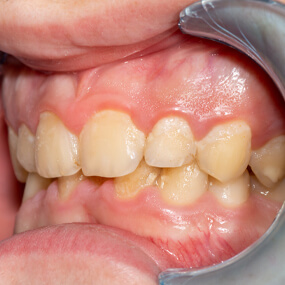How Your Teeth Brushing Habits Can Affect Heart Health

The American Dental Association recommends that you brush your teeth twice a day for at least two minutes at a time. A new study suggests that advice can actually lower your risk of cardiovascular disease.
This is not the first peer-reviewed study to demonstrate a link between heart disease and periodontal disease, which often involves infection of the gums, inflammation of the gums, tooth damage, and even tooth loss. However, this research, which was presented at Scientific Sessions hosted by the American Heart Association in Chicago, distinguishes itself through perspective. These researchers looked specifically at how good and poor brushing habits may make a person less or more prone to heart disease.
Nearly 700 people were interviewed concerning their brushing habits, and that data was adjusted for various factors. Those who were forthright about brushing less often than twice a day and for fewer than two minutes at a time were at three times greater risk of heart disease than those in the other group.
The lead researcher—Dr. Shogo Matsui of Hiroshima University in Japan—said that the data supported their expectations: poor oral hygiene leads to poor oral health leads to poor general health. It may also be possible that increased brushing—such as those who brush for three minutes as opposed to only two—might reduce the risk further, but determining such would require more research.
Dr. Ann Bolger—a professor of medicine emeritus and a cardiologist at UCSF—noted some limitations inherent to this observational study. It is perfectly reasonable to expect that people who consistently brush twice a day and for two minutes or more at a time are detail-oriented in other areas of their health care as well.
Nevertheless, science certainly supports the link between oral health and heart health. In fact, modern medicine is determining just how damaging gum disease actually is. Periodontal disease can put a body into a constant state of inflammation, which is a leading indicator of heart disease.
A separate paper, which was published in the AHA journal Hypertension, demonstrated a link between gum disease and hypertension. Not only did gum disease increase blood pressure, but it interfered with the various medications prescribed to lower and manage those levels.
Dr. Bolger also noted that poor oral health is particularly concerning to patients who have problems with their heart valves. She discussed how she spends a great deal of time talking with her patients about oral hygiene since poor oral health can exacerbate existing heart valve conditions.
The American Dental Association recommendation is simple, and you can easily incorporate it into your lifestyle. Brush after breakfast. Brush before bed. Brush two minutes at a time. Use fluoride toothpaste, and floss between your teeth and gums once daily. Once it becomes a habit, you will hardly even think about it, and yet, it can have a tremendous effect on your health now and in the years ahead.
Protect Your Heart Through Better Oral Hygiene
Safeguarding your heart health begins at home with regular brushing and flossing. You should also visit your dentist at least twice a year to have your teeth cleaned and examined. Early diagnosis by your dentist of any potential problems can go a long way toward you being as healthy as possible. Jeffrey D. Clark, DDS, is a leading dentist who appreciates the link between oral health and general health. Call Scottsdale Cosmetic Dentistry Excellence at 480 585 1853 to schedule your appointment with Dr. Clark today.




